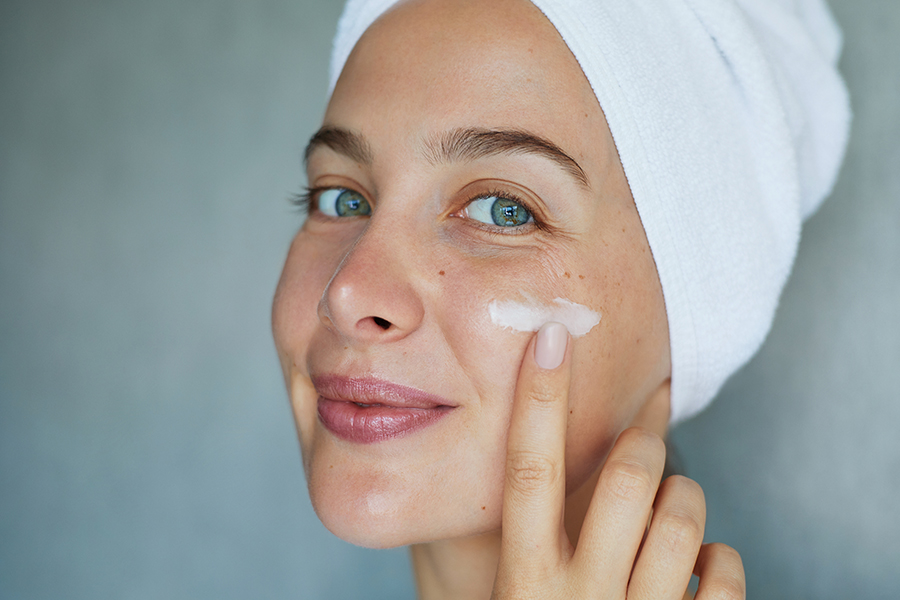Let’s be honest: You know this already. You know that you should be wearing sunscreen to protect yourself from skin cancer, and you probably lather up when you head out to the pool or the beach. But do you wear it every day?
(Be truthful, now!)
You should. According to the American Academy of Dermatology (AAD), one in five Americans will be diagnosed with skin cancer in their lifetime. Beyond skin cancer, however, studies have shown that sunscreen, used regularly, can also slow and even prevent visible signs of aging, including dark spots, discolorations, fine lines, and wrinkles.
Now let’s answer some common sunscreen questions and hopefully convince you that wearing sunscreen is more important than ever.
The higher the SPF, the more protection — right?
Well, technically, yes. But you might think that a sunscreen with SPF 100 would be twice as effective as SPF 50, and that’s not the case. In fact, it’s only a few percentage points more effective.
SPF measures the percent of the sun’s UV rays that the sunscreen blocks. For example, SPF 15 blocks 93% of the sun’s rays, while SPF 30 blocks 97%. The AAD recommends SPF 30 or higher for most people.
If it’s cloudy, do I need to wear sunscreen? What if I’m just going from my car to the office?
Every day means every day! UV rays aren’t blocked by clouds, and you can still get damaging sun exposure on a cloudy day. The same is true for short exposures. Sure, you may only be walking from your car to the office before spending the day inside — but you’re doing that every day. Not to mention, you get sun exposure through the windows of your car as well. In short, you need sunscreen every day to see the most benefits.
I have sunscreen from last summer. Is it still good?
Yes! Most sunscreens have a shelf life of two years, and most now have an expiration date printed on the bottle. But if you’re applying enough, you probably shouldn’t have any left over from last summer. Which brings us to…
How much is enough?
One little squirt isn’t going to cover it. You should be wearing about a silver-dollar sized amount on your face and exposed skin (like the backs of your hands) every day. When you are headed to the pool, you need a full ounce (the size of a shot glass or ping pong ball) to cover your entire body. For best results, you should apply it 30 minutes before sun exposure to let it absorb, and apply again every two hours after that.
If I use waterproof sunscreen, do I still have to reapply?
Actually, there’s no such thing as truly waterproof sunscreen — just water resistant. That means that if you’re getting wet or sweating, you still need to reapply every two hours.
If my makeup has an SPF, is that good enough?
Wearing makeup with an SPF is better than nothing, but not as effective as wearing a layer of regular sunscreen underneath. Look for a formula made for faces that won’t clog pores. We carry a variety of medical-grade sunscreens in our office that can be matched to your specific skin type and tone.
Can sunscreen cause cancer?
No. The active ingredients are broken down by the UV rays long before they are absorbed into your body. But if you’re still concerned about chemicals, look for products that use physical blocking ingredients such as zinc oxide and titanium oxide, which stay on the surface of the skin as a protective barrier. Just know that these products are not meant to blend and disappear into the skin like many sunscreens, and therefore may still be visible while you are wearing them.
Does a sunscreen with antioxidants provide better protection?
Yes! Even an SPF 50 sunscreen only blocks 98% of the sun’s rays, so antioxidants — while not “active” sunscreen ingredients — can help prevent the rays that do sneak through from causing damage.
If you are interested in learning more about sun protection or would like to hear about the medical-grade sunscreens we offer, click here to contact our office and a member of our staff will be in touch!

